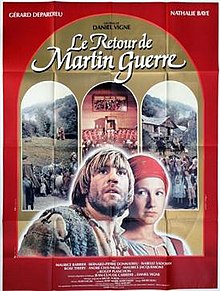The Return of Martin Guerre
| The Return of Martin Guerre | |
|---|---|
 | |
| Directed by | Daniel Vigne |
| Written by | Daniel Vigne Jean-Claude Carrière Natalie Zemon Davis |
| Produced by | Daniel Vigne |
| Starring | Gérard Depardieu Nathalie Baye |
| Cinematography | Andre Neau |
| Edited by | Denise de Casabianca |
| Music by | Michel Portal |
| Distributed by | European International |
Release date | 14 May 1982 |
Running time | 122 min |
| Country | France |
| Language | French |
The Return of Martin Guerre (
Synopsis
The film relates the historical case of Martin Guerre, who leaves his young wife in a small French village to go fight in a war, and to travel. Eight or nine years later, Martin (played by Depardieu) returns to resume his life. The man initially is acknowledged and welcomed by the wife, family, and friends because he knows the intimate details of his former life.
As time passes, however, vagabonds identify Martin as Arnaud of the neighbouring village of Tilh,[1] but the villagers dismiss these claims as lies. But when Martin makes a demand for money he's owed by his uncle, the uncle is outraged and attacks Martin. This leads to a trial on his identity, with his life at stake, since if he is not Martin he and Martin's wife Bertrande are adulterers and their child a bastard. This trial constitutes most of the film.
Martin argues well, and the villagers are divided on whether the man is in fact Martin, Bertrande siding with him. After several elevations of the proceedings up to a court in the Parlement, the judge, Jean de Coras, prepares to acquit Martin primarily on the strength of the testimony of Bertrande.
At the last minute, another witness appears in court, bearing an even stronger resemblance to the young Martin and casting everything into doubt once more. The impostor confesses that he was a soldier with the real Martin, who said he was never going back to his village, upon which the impostor decided to take his place. Even Bertrande changes her mind and says the new witness is Martin. Arnaud is sentenced to death.
Some time later, De Coras visits the village to tell Bertrande that she has been acquitted and is innocent of conspiracy with Arnaud. But he has deduced that she recognized the impostor from the very beginning and asks her why she claimed he was Martin. She says that he was a better husband and man, and they had a good life together. De Coras asks her then why she changed her mind at the last minute. She says she saw in Arnaud's eyes that the case had become hopeless and that he wanted her to feign ignorance so as to live for herself and her children.
Arnaud is led to the gallows, repenting all the while. A voiceover closes the historical framework by mentioning that de Coras was executed some years later for his Protestant beliefs.
Reception
The Return of Martin Guerre was nominated for
Book
In 1983, a book of the same name was published by Natalie Zemon Davis, an American historian of early modern France and professor at Princeton University. She had served as a consultant and helped write the screenplay for the film.
Remakes and musical
Sommersby is a 1993 Hollywood remake of the film in English, transposed to the American Civil War and starring Richard Gere and Jodie Foster.
A West End (London)
The first feature film from East Timor, A Guerra da Beatriz (Beatriz's War) was released in 2013. It is a re-telling of the story of Martin Guerre, but set in the 1980s, during the Indonesian occupation of East Timor. It stars Irim Tolentino, who co-wrote the script with the director, Bety Reis.[4]
Cast and roles
- Gérard Depardieu - "Martin Guerre" (Arnaud du Tilh)
- Nathalie Baye - Bertrande de Rols
- Maurice Barrier - Uncle Pierre Guerre
- Bernard-Pierre Donnadieu - Martin Guerre
- Isabelle Sadoyan - Catherine Boëre
- Rose Thiéry - Raimonde de Rols
- Chantal Deruaz - Jeanne
- Maurice Jacquemont - Judge Rieux
- Roger Planchon - Jean de Coras
- Dominique Pinon - Antoine
- Philippe Babin - Jacques
- Valérie Chassigneux - Guillemette
- Adrien Duquesne - Sanxi Guerre
- Tchéky Karyo - Augustin
Awards
- Nominee: Best Costume Design Academy Award(Anne-Marie Marchand)
- Nominee: Best Foreign Language Film BAFTAaward
- Winner: Best Original Screenplay César Award(Jean-Claude Carrière, Daniel Vigne)
- Winner: Best Music Cesar Award(Michel Portal)
- Winner: Best Production Design Cesar Award(Alain Negre}
- Nominee: Most Promising Actor Cesar Award{Dominique Pinon)
- Winner: Best Foreign Film National Board of Review
- Winner: Best Actor National Society of Film Critics (Gérard Depardieu)
- Winner: Best Foreign Film Kansas City Film Critics Circle
Notes and links
See also
References
- langue d'oc. This was evidently the spelling used at the time of the story, as witnessed by the spelling of Arnaud du Tilh. This is also the spelling used by Natalie Zemon Davis in her book on Martin Guerre.
- National Board of Review of Motion Pictures. 2016. Retrieved 17 November 2016.
- ^ "1984 | Oscars.org | Academy of Motion Picture Arts and Sciences". Oscars.org. Retrieved 2023-11-22.
- ^ "Beatriz's War in Australian Cinemas : A Guerra da Beatriz". www.aguerradabeatriz.com.
Bibliography
- Davis, Natalie Zemon. The Return of Martin Guerre. Cambridge: Harvard University Press, 1983. ISBN 0-674-76691-1
- Lewis, Janet. ISBN 978-0804003216.
